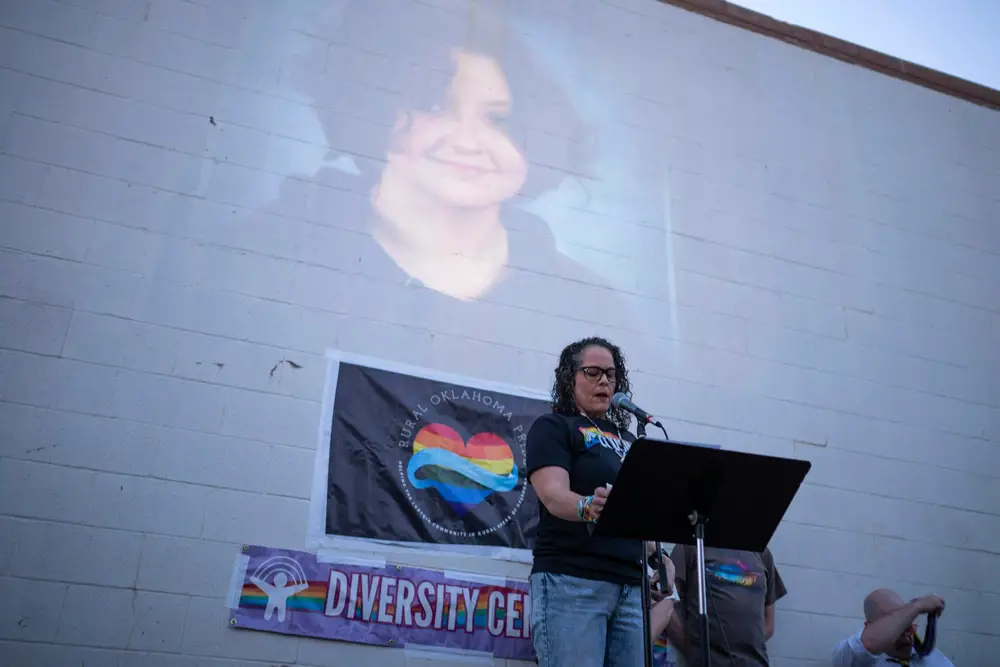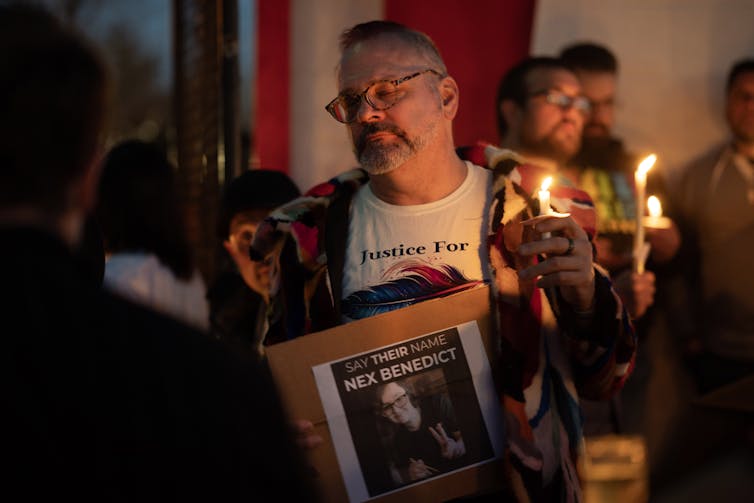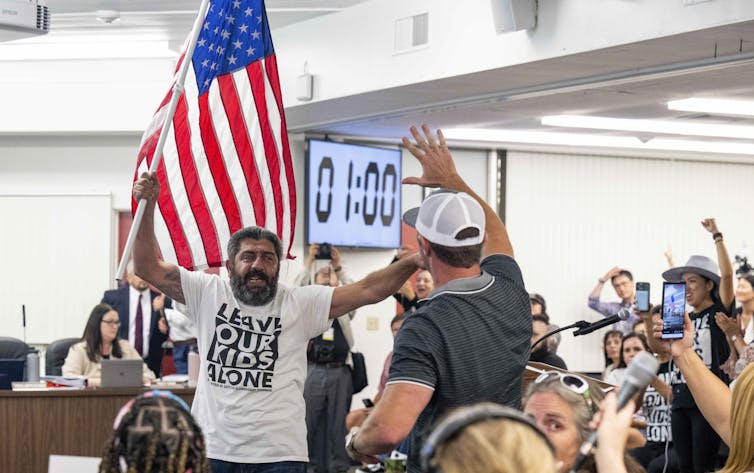
By Marie-Amelie George
No charges will be filed in connection with a bathroom fight that happened the day before a 16-year-old nonbinary high school student, Nex Benedict, died by suicide in Oklahoma. The Tulsa County district attorney’s office made the announcement on March 21, 2024.
Benedict was beaten so badly by three female students that they blacked out and had to go to the hospital for treatment. The students previously mocked Benedict and their friends “because of the way that we dress,” according to a statement Benedict gave to the police the day of the fight.
The news of Benedict’s death generated outrage from LGBTQ+ rights activists, who connected the tragedy to the sentiment and ideology behind a wave of anti-LGBTQ+ laws sweeping the country.
In 2024 alone, various state legislatures have introduced almost 500 such bills, many of which target LGBTQ+ youth in schools. Some of these bills restrict which restrooms transgender students can use and which sports teams they can join. Others censor the information that all students receive at school about sexual orientation and gender identity. As of March 2024, 189 of these proposals have advanced and 15 have been enacted.
The number of reported LGBTQ+ hate crimes committed at schools more than doubled between 2018 and 2022, particularly in states like Florida, Georgia, Oklahoma and Texas, which have anti-LGBTQ+ laws. Transgender and nonbinary students, in particular, are more likely to be harassed and assaulted today than they were five years ago.
As a law professor who has written extensively on gay and lesbian legal history and contemporary LGBTQ+ rights, I have studied the legislative debates over these bills in detail. What they reflect is many people’s continuing discomfort with – and sometimes outright hostility to – transgender and nonbinary identity.

J Pat Carter/Getty Images
Understanding transgender and nonbinary identity
Here are a few important points to understand about transgender and nonbinary individuals.
Transgender publicly emerged in the U.S. as a kind of social identity in the 1990s, while the first use of the term nonbinary dates to the early 2000s.
People identified as transgender or nonbinary long before either term came into existence.
However, both labels are relatively new. So is the word cisgender, the term for individuals whose gender identity corresponds to their sex assigned at birth.
Approximately 1.3 million American adults – meaning 0.5% of the American population – identify as transgender or nonbinary. That rate is much higher among young adults. Approximately 5% of Americans between the ages of 13 and 18 identify as transgender or nonbinary.
There is some overlap between transgender and nonbinary identity, but the two categories are distinct. Transgender individuals are people whose gender identity differs from their gender assigned at birth. Many, but not all, transgender individuals identify as male or female.
Often, transgender individuals will seek medical care, such as hormone therapy or surgery, so that their physical body matches both how they view themselves and their gender identity. However, not all do, in large part because the cost for this kind of treatment is so expensive. Insurance policies increasingly cover the costs, but deductibles and other out-of-pocket costs can be extremely high.
Transgender individuals are also more likely to be unemployed and living in poverty than most Americans. As a result, they often do not have insurance to cover the US$50,000 to $130,000 price tag of the surgeries. Others decline surgery because it is simply not right for them personally.
Some transgender individuals identify as nonbinary. Nonbinary individuals have a gender identity that does not neatly fit the traditional categories of male or female. Some nonbinary people combine elements of both genders, while others reject gender in its entirety, such that they have a gender-neutral appearance. Still others have a fluid gender, meaning they identify at times as male and other times as female. To reflect this reality, nonbinary individuals often use they/them pronouns.
The overlap between transgender and nonbinary makes it difficult to pinpoint just how many Americans identify as nonbinary.
Violence against transgender and nonbinary people
Transgender and nonbinary individuals face widespread discrimination and high rates of violence.
Transgender individuals are more than four times more likely than cisgender people to be victims of violent crime. They are especially likely to be attacked when they try to use public restrooms. Compared to their heterosexual and cisgender peers, transgender adolescents are disproportionately likely to experience psychological, physical and sexual abuse.
The majority of LGBTQ+ teens report being bullied in schools.
A 2022 report by the Trevor Project , a nonprofit focused on suicide prevention, revealed that 45% of LGBTQ+ people aged 13 to 24 seriously considered attempting suicide the previous year. Almost 20% of transgender and nonbinary young people actually tried to end their lives.

Leonard Ortiz/MediaNews Group/Orange County Register via Getty Images
Political divides
In recent years, LGBTQ+ rights advocates have secured important legal victories for transgender and nonbinary individuals. This includes conversion therapy bans, which prohibit licensed mental health professionals from trying to get minors to change their sexual orientation or gender identity. There are other new laws in several states that require school districts to include stories of LGBTQ+ people and history in civics, or social studies classes..
Republican-led states like Arkansas and Florida have passed laws that discriminate against LGBTQ+ people, particularly transgender and nonbinary individuals. Republican lawmakers have opened child abuse investigations against the parents of transitioning minors in Texas and banned drag performances in Montana and Tennessee, although a federal judge struck down Tennessee’s law.
While 61% of Democrats recognize that a person’s gender could be different than their sex assigned at birth, only 31% of Republicans agree. Additionally, 66% of Republicans also believe that society has gone too far in accepting transgender individuals.
Because so many Republicans oppose transgender identity, GOP lawmakers have seized upon anti-LGBTQ+ laws as a way of driving voters to the polls.
Local school boards in places like Florida and Texas have also censored library books that discuss gender fluidity and restricted transgender students’ ability to access the restroom that aligns with their gender identity.
The high stakes
Some Republican politicians claim that the laws are necessary to protect the rights of parents who object to LGBTQ+ rights. But the laws have created a hostile school environment that is devastating for young LGBTQ+ students.
LGBTQ+ rights activists have pressed schools to instill tolerance for same-sex sexuality and transgender identity. Data shows LGBTQ+ youth who live in a community accepting of LGBTQ+ identity report significantly lower rates of suicide attempts.
But many legislators have done the opposite. Eighteen states, including Arkansas, Florida, Indiana, and North Carolina, now have laws that restrict how teachers can talk about sexual orientation and gender identity. Among the list is Nex Benedict’s home state of Oklahoma.
![]()
Marie-Amelie George is Associate Professor of Law at Wake Forest University.





























endangered species says
Hate crimes are doubling? I think the GOP want it to triple with endless growth. I dont know one republicon that would care that kids are killing themselves. their treacherous laws and hate spewing make the kids that need the most support get nothing but hate from their schools and you know how mean kids can be to each other. Ms Chong tore down that safe space sign (backed by racist ron himself).Just wrong and sad that so many support these corrupt republicons to force their hate throughout the country. If its good for the average american , you be be assured republicons will fight hard against it.
Ed P says
Endangered species,
Hate is an extreme emotion. Your comment was unsettling to me because I am in fact an 85% pure Republican and I don’t believe any political affiliation could turn a person into not caring about children being hurt or killed, unless someone is not mentally healthy.
I also believe I’m much more mainstream America than even yourself based on your comments here on Flagler Live.
We should all set aside the vitriol and seek common ground to discuss issues instead of using ridiculous or vial comments to express our feelings. Contrary to some popular belief the overwhelming majority of all people are good intentioned. Some children can be cruel but the masses are kind and understanding. I have a special needs grandson who is now 23. He was mainstreamed his entire education and was almost revered by his class mates once they actually met him. I learned more from Sebastian and his classmates over his 20 years then I can quantify.
Endless dark money says
That’s interesting to me that a group that takes away womens rights, eliminated child tax credits, bans books, bans black history, spews hate, creates divisiveness, removes diversity programs, removes kids lunches, defunds public schools, obs3esed about what people do with their genitals. Those sound like good intentions to you?? Please tell us more.. to debate you need facts and to rebublicons facts are woke.
Ed P says
Endangered,
Actually to have a debate- YOU must be factual.
KES says
Male and Female, (God) Creator, Sustainer, and Father created them. Genesis 1-11. Men and women are without excuses before God. Romans 1.
Pierre Tristam says
Genesis and Romans is, are, good mythology. Neither trumps human dignity, and both often demean human dignity in the name of a cruel, obnoxious god made in the image of cruel, obnoxious human beings.
Whathehck? says
Why can’t we all live in peace. I was born heterosexual it was not a choice, it is not a choice either for non-heteros. Let all live as they need to. If you believe God created all humans then you know that He created LGBTQ+ people too and respect them as any God’s creatures. Treat others as you want to be treated. “This is my commandment, that you love one another as I have loved you.”
“Let us not become conceited, provoking one another”. Go in peace and love thy neighbor.